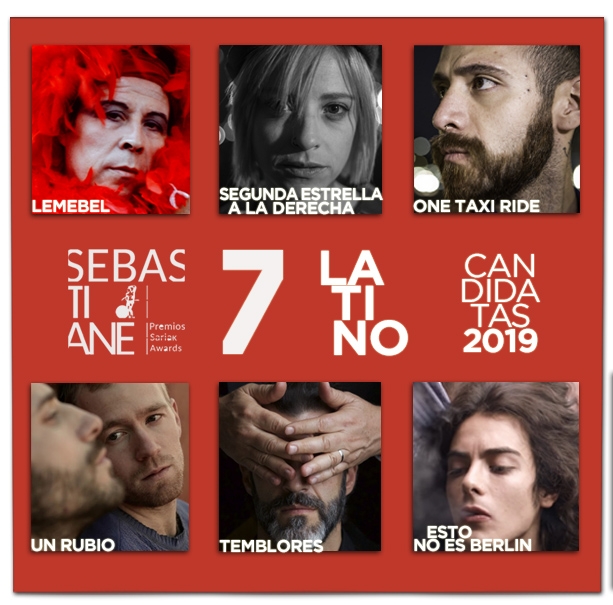A jury made up of members of GEHITU, the LGBT Association of the Basque Country, will be presenting the Sebastiane Latino Award to one of the six Latin American films that will be competing for the award at the 67th San Sebastián Festival.
The films that will be competing for the Sebastiane Latino Award, which this year will be presented for the seventh time, are Lemebel, Segunda estrella a la derecha, One Taxi Ride, Un rubio, Temblores and Esto no es Berlín. The award will go to the Latin American feature film that best defends the demands and values of lesbians, gays, transexuals and bisexuals.
According to GEHITU, what all the films that have been selected have in common is that they speak out against, “unspoken violence: the violence that is self-imposed on desire itself, religious violence that aims to cure this with pseudo-sciences, cases of gay male rape that go unreported, or the lack of visibility of bisexuals and sometimes of lesbians”. Some of the films that have been nominated also recall the role of LGTBI pride in countercultures like the one in 1980’s Mexico or figures like the Chilean thinker and artist, Lemebel.
Last year, the Uruguayan film Las herederas, directed by Marcelo Martinessi, received the 6th Sebastiane Latino Award “because its director chose to lend visibility to a mature lesbian couple”.
LEMEBEL
Joanna Reposi Garibaldi (Chile, Colombia)
A documentary about the Chilean Pedro Lemebel (1952-2015), a visual artist, writer and pioneer of the Queer movement in Latin America, the film covers some highly significant moments in his life using videos and photographs of his private life, as well as images of his most emblematic performances.
SEGUNDA ESTRELLA A LA DERECHA
Ruth Caudeli (Colombia)
Emilia, a bisexual actress in her thirties, refuses to grow up like her lifelong friends while she tries to fit into the ‘perfect’ world of her social circle. She survives by giving acting classes and feels more comfortable with her students than with people of her own age. At a hen party she will find out that she is not the only women who is unhappy with her life and that we are all hiding what we really are.
ONE TAXI RIDE
C.K. Mak (Mexico, Singapore)
Erick’s life changed forever when he got in a taxi and was raped by the driver and two accomplices. He was 17 years old and he didn’t report it to the police, he didn’t go the doctor and he didn’t tell his family or friends about it either. This documentary tells the story of the journey that this youngster embarks on a decade later to get his life back.
UN RUBIO
Marco Berger (Argentina)
Gabriel moves into a flat with Juan, a young womaniser, in the suburbs of Buenos Aires. Shy and reserved, ‘Gabo’ tries to ignore his flatmate’s glances and his wandering hands, as his ‘virility’ seems to be beyond any doubt. However the attraction between the two of them is undeniable.
TEMBLORES
Jayro Bustamante (Guatemala, France, Luxembourg)
Pablo is a devout Christian, and a wonderful husband and father. He is a good example in Guatemalan conservative society, until, like an earthquake, true love comes into his life. Thanks to his family and the church he’ll be able to overcome these feelings; it is his only way out if he doesn’t want to lose his children.
ESTO NO ES BERLÍN
Hari Sama (Mexico)
Mexico City, 1986: Carlos, a 17-year-old teenager, feels that he doesn’t fit in anywhere. The only thing he likes is music and he is attracted to Rita, the older sister of his best friend, Gera. His life takes a new turn when he visits a club where he’ll discover night life, sexual freedom and drugs, but the place will also test the friendship between both youngsters.





